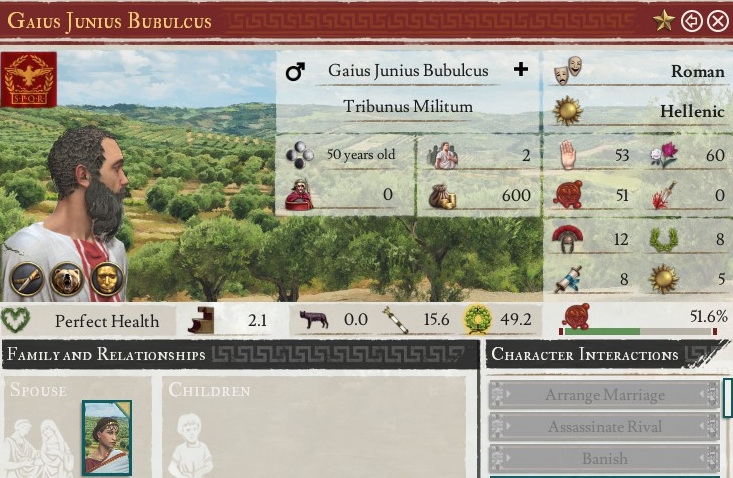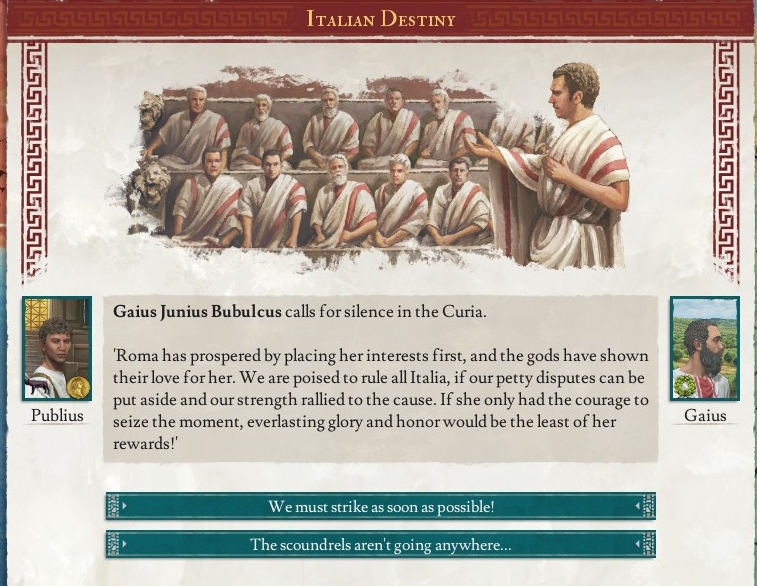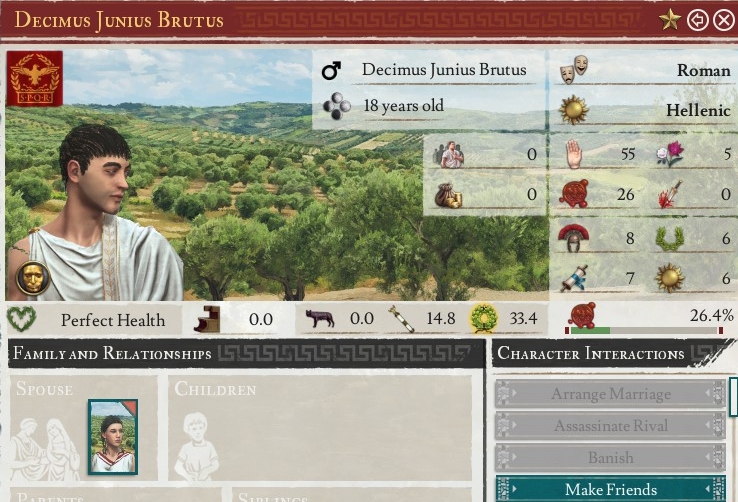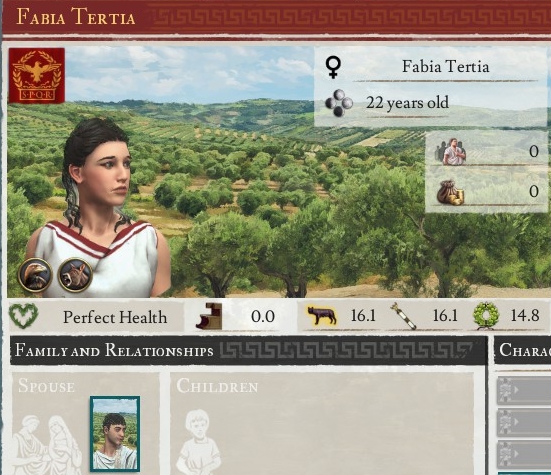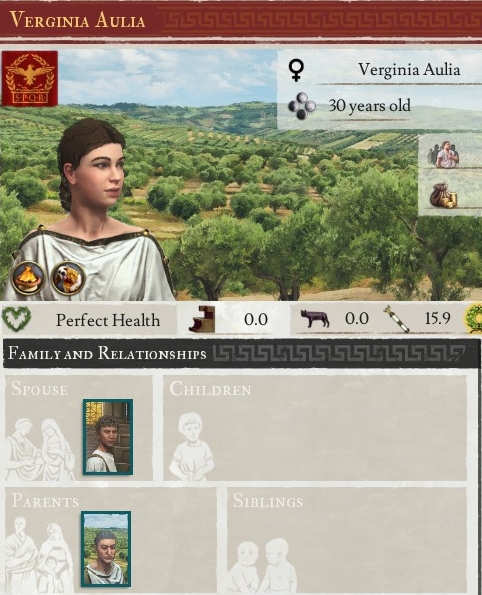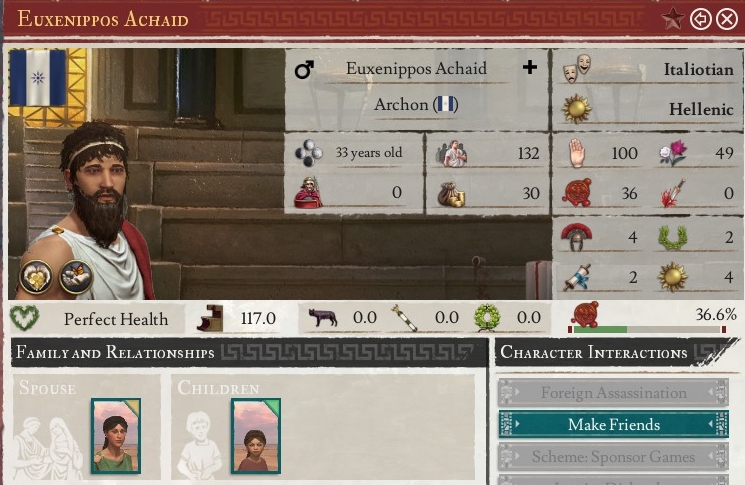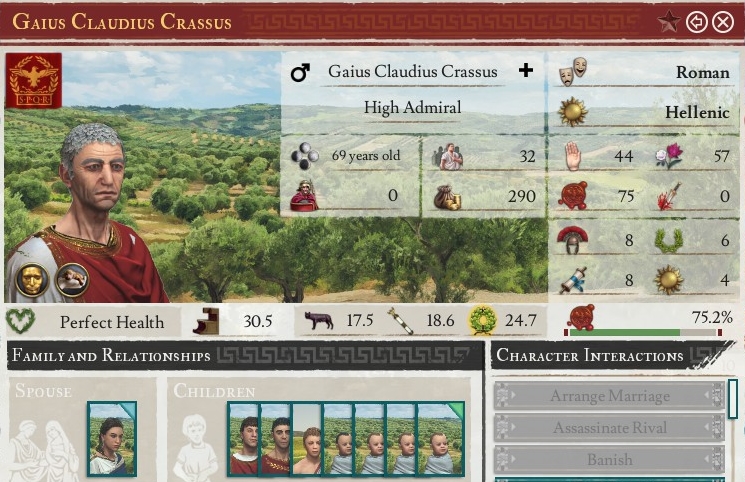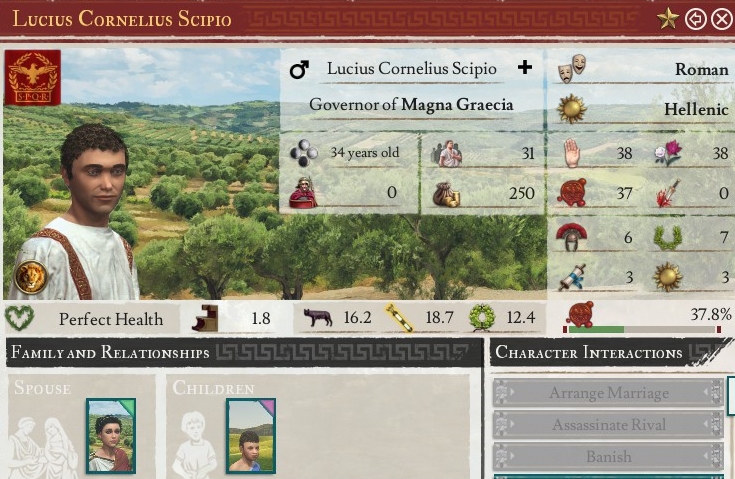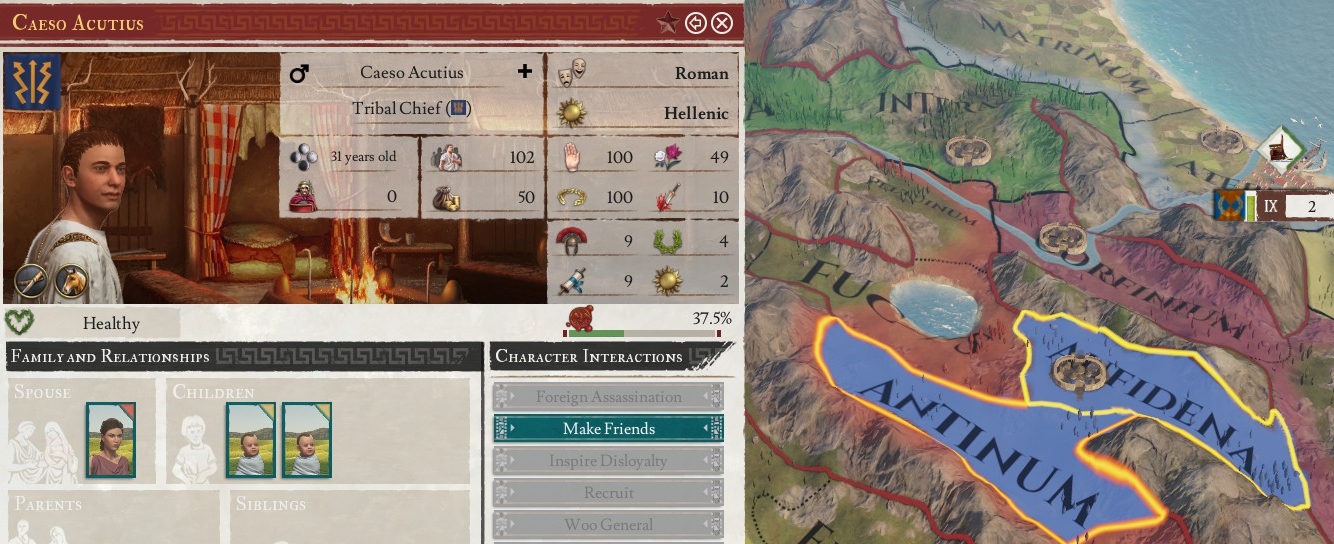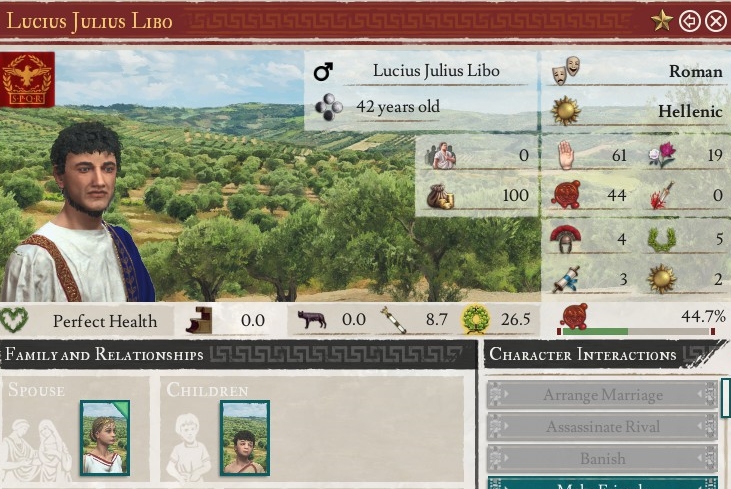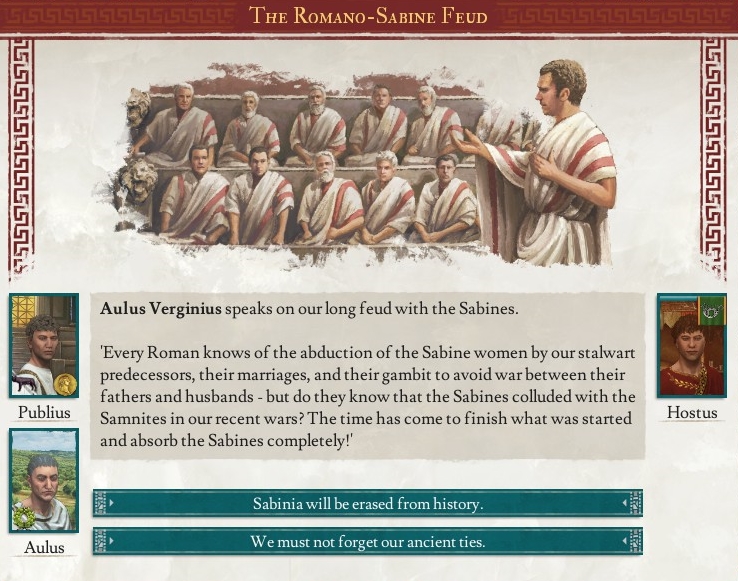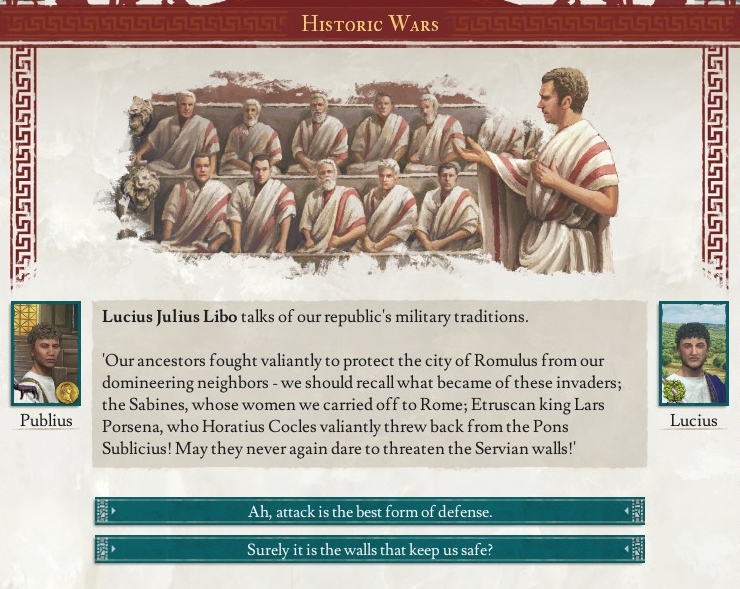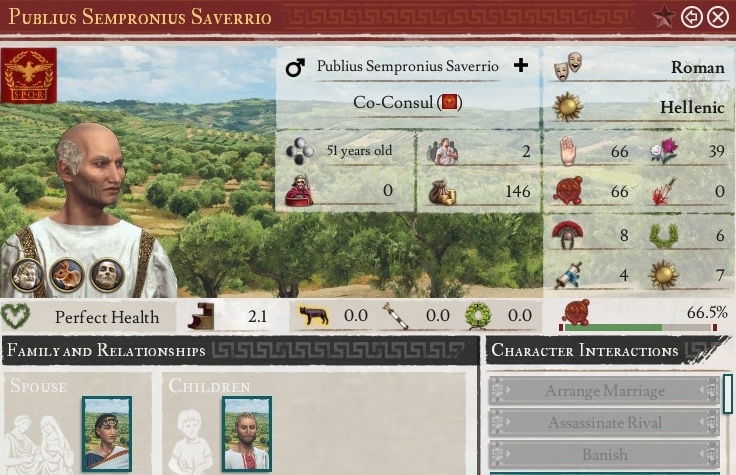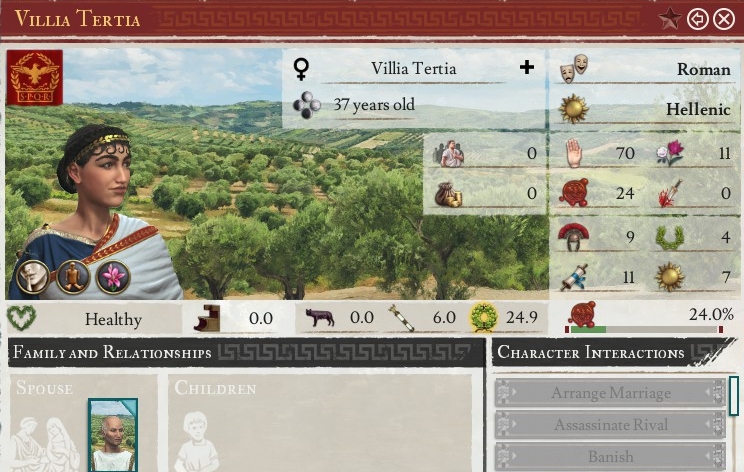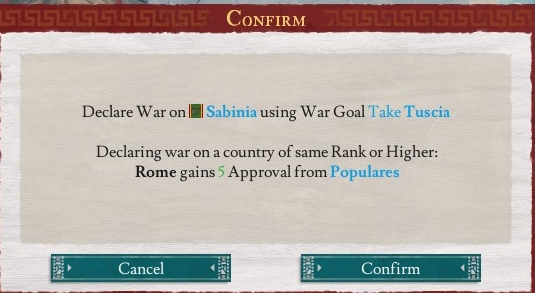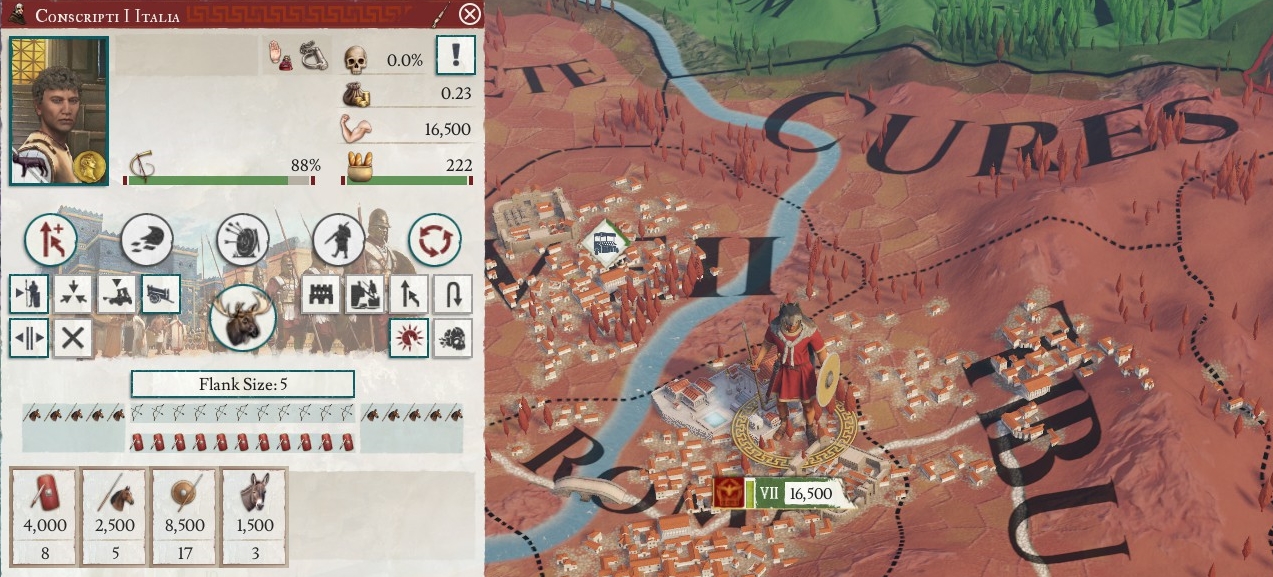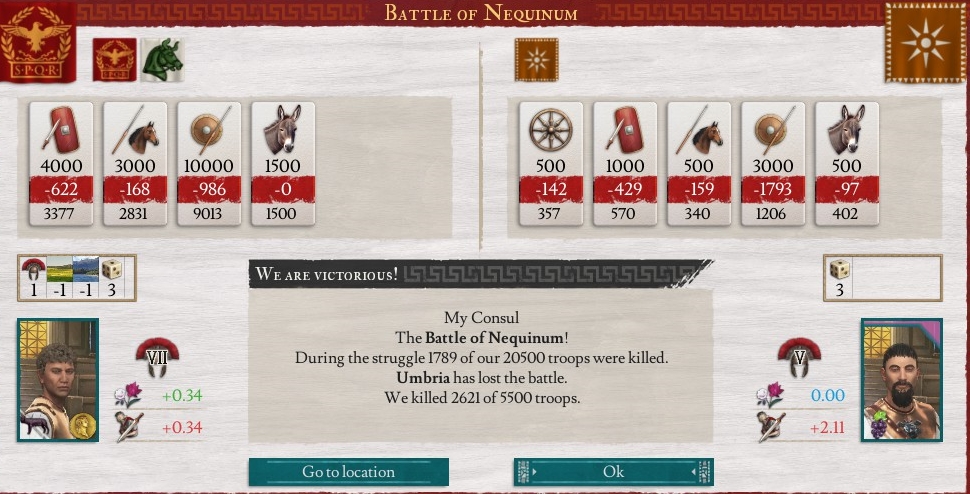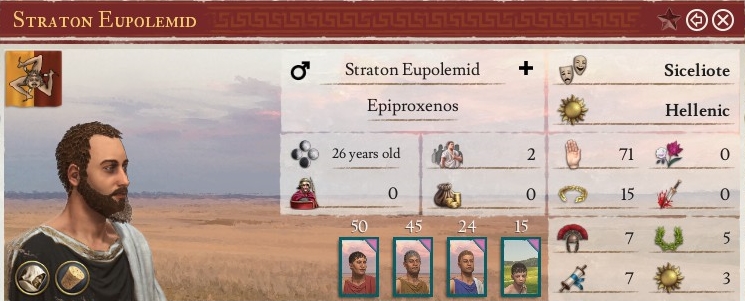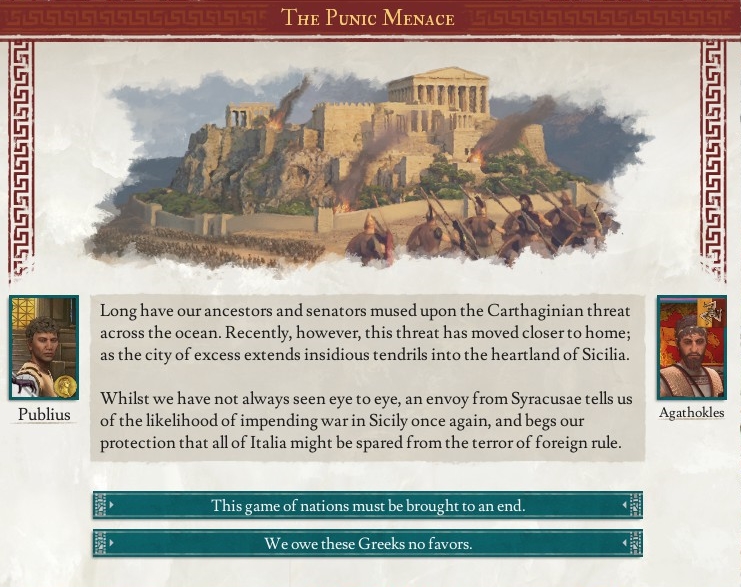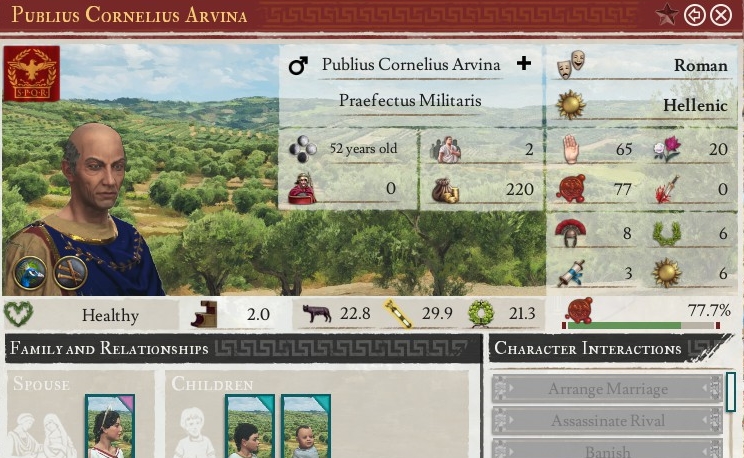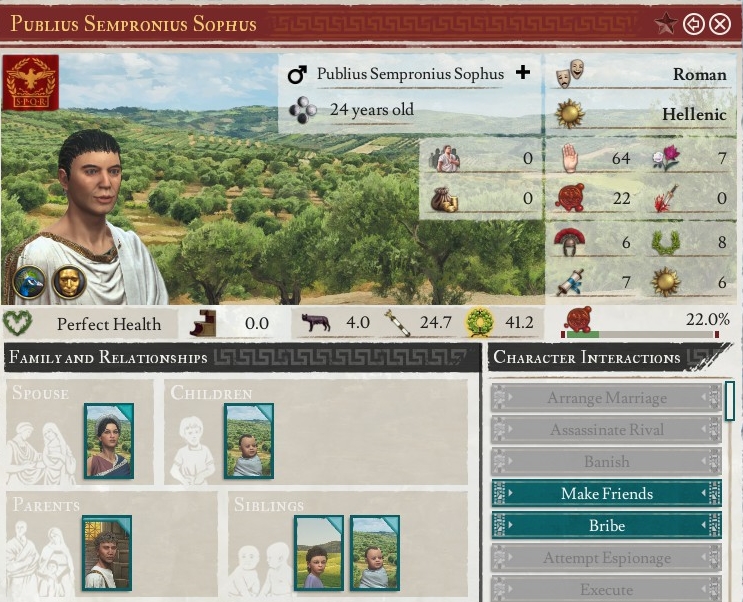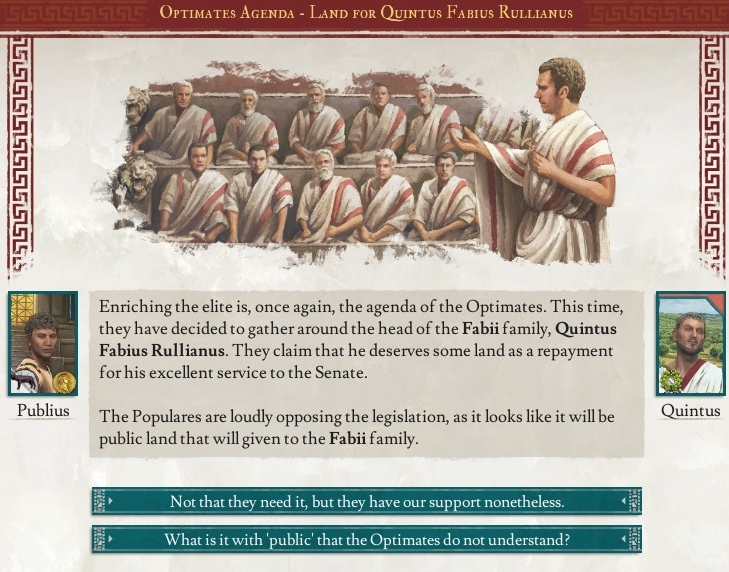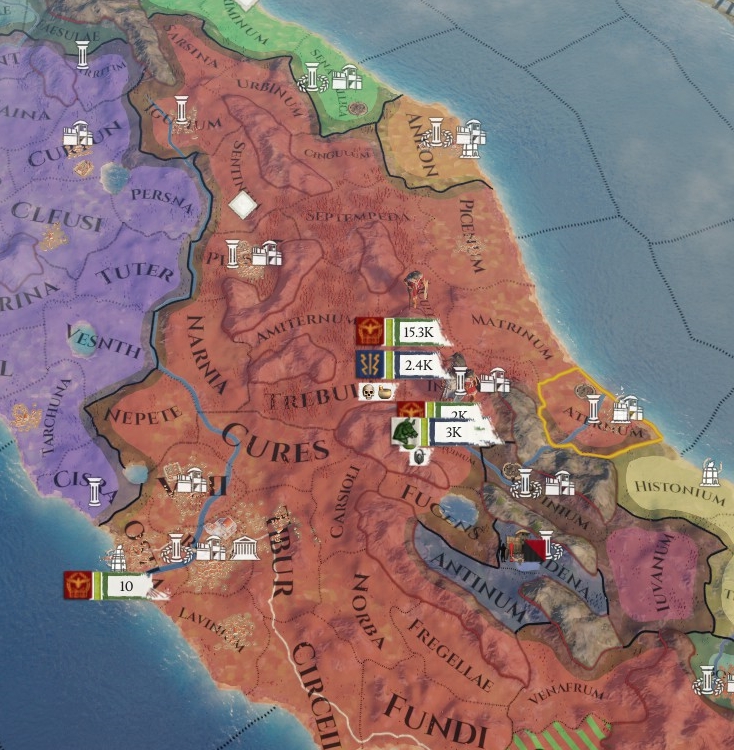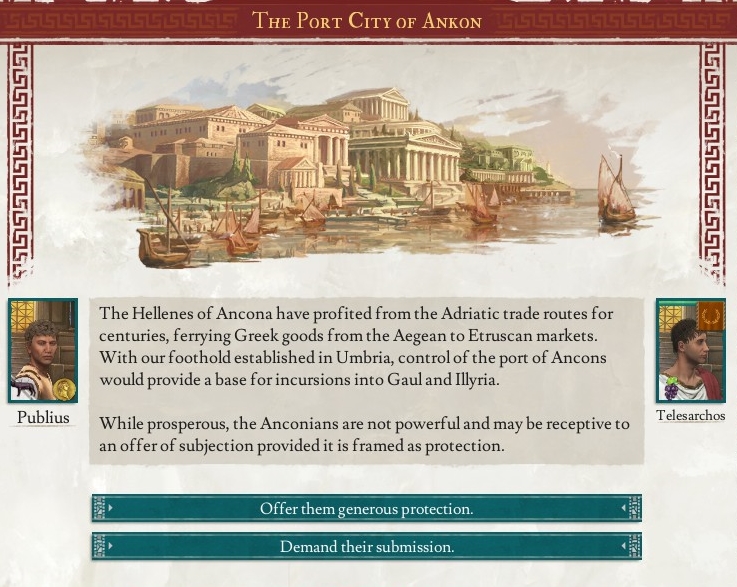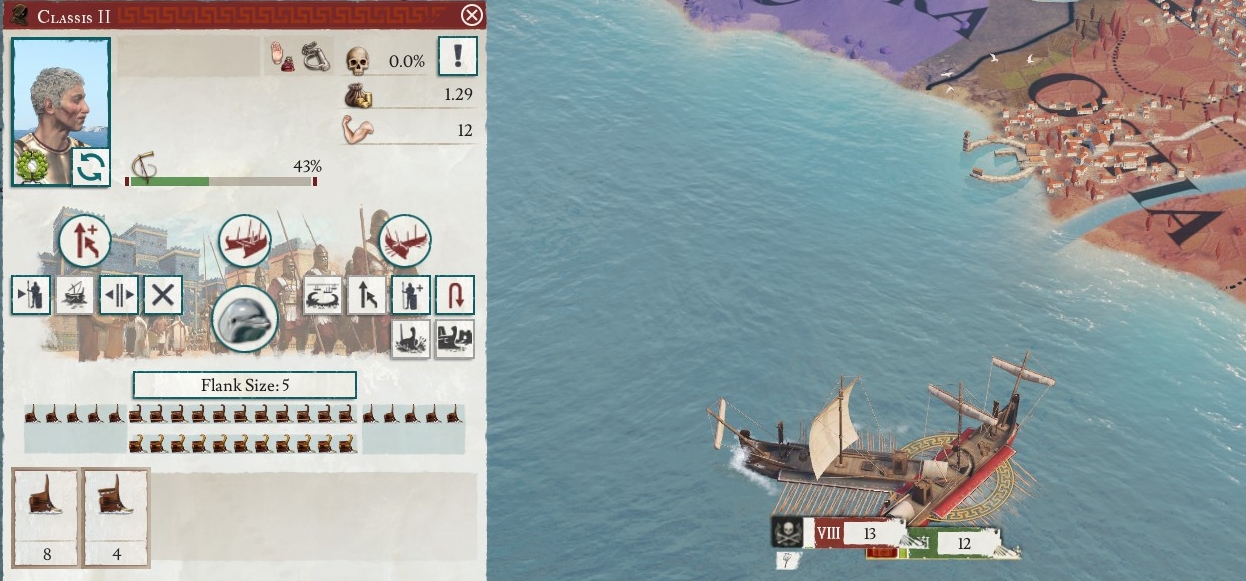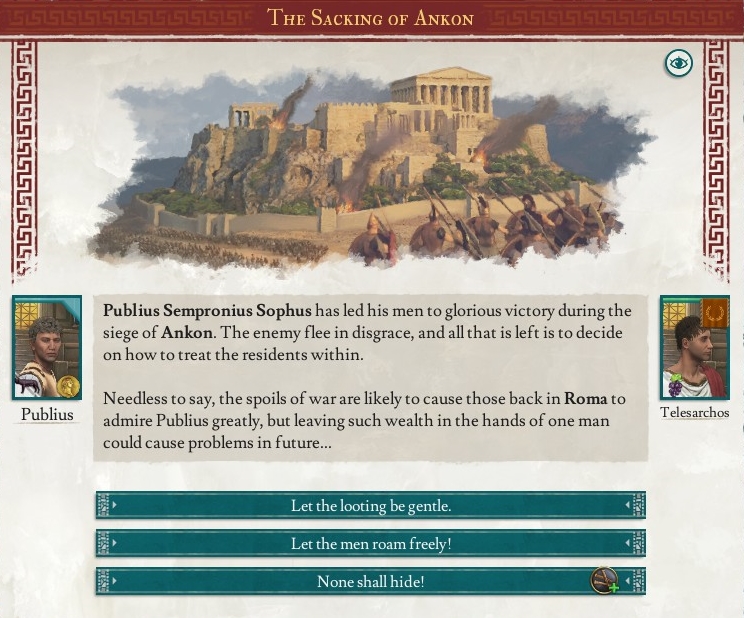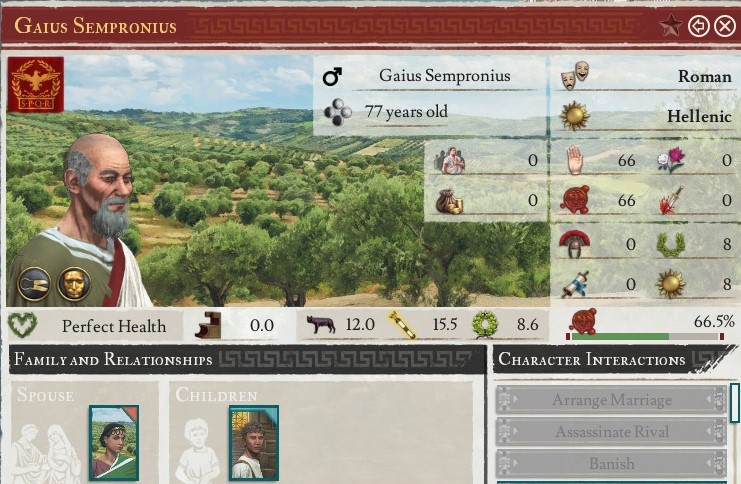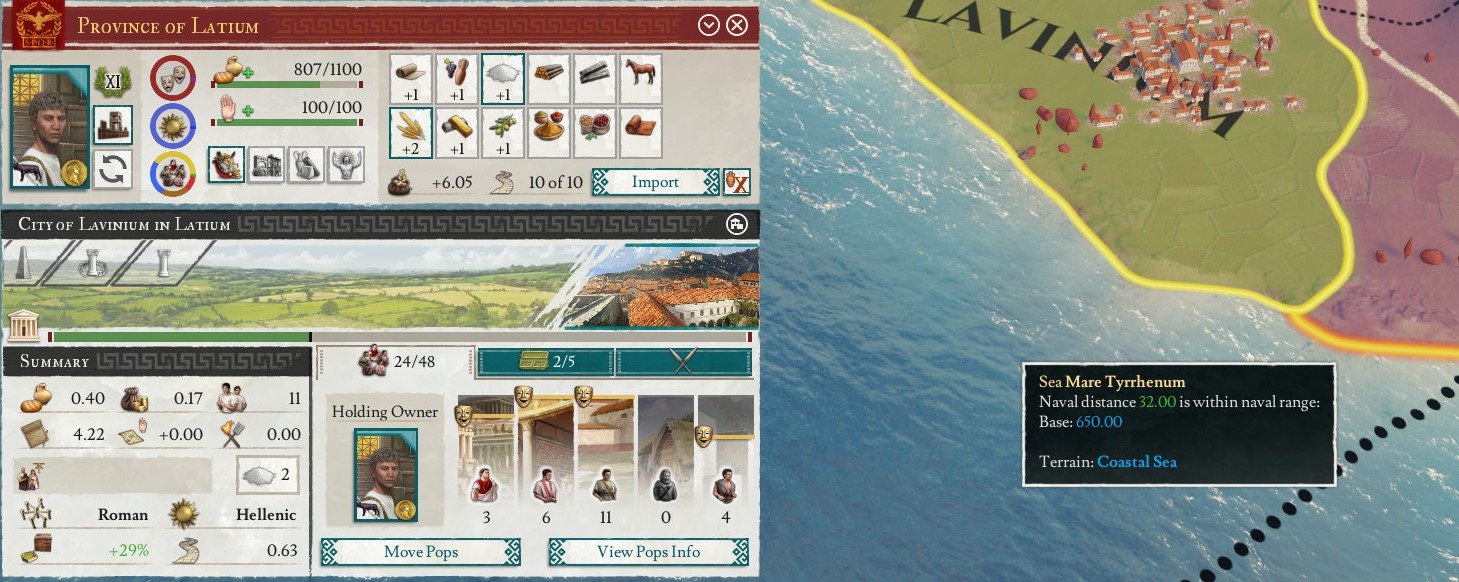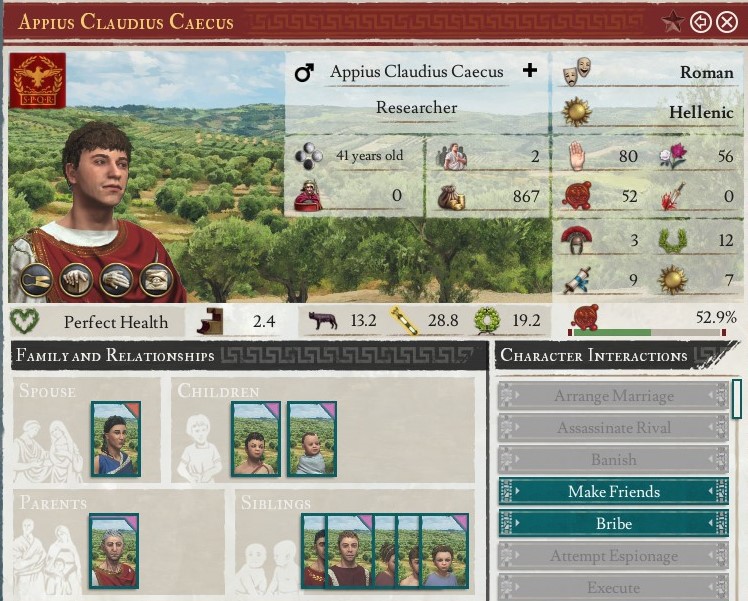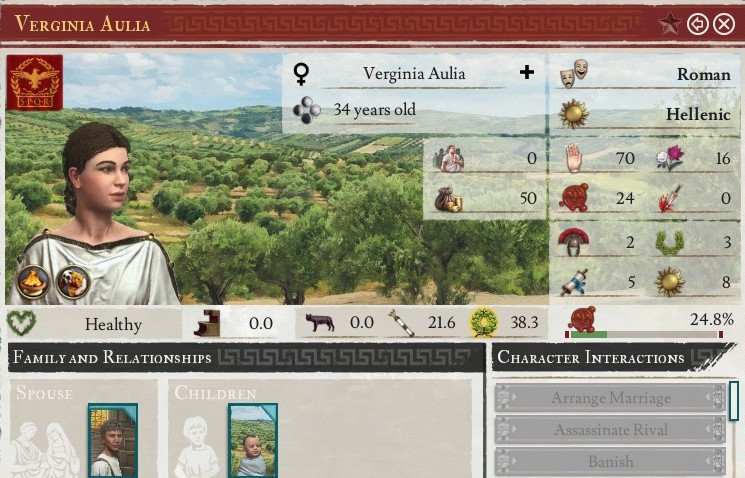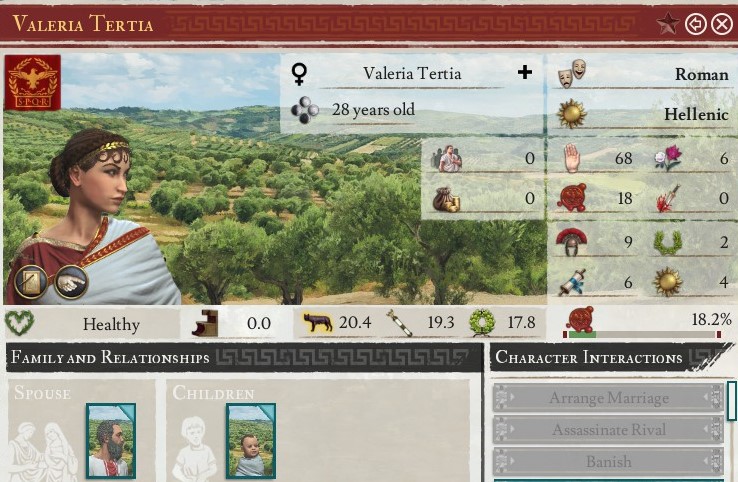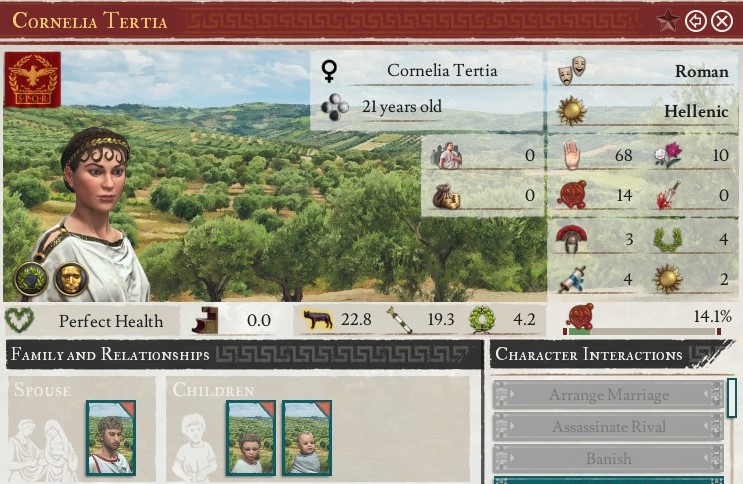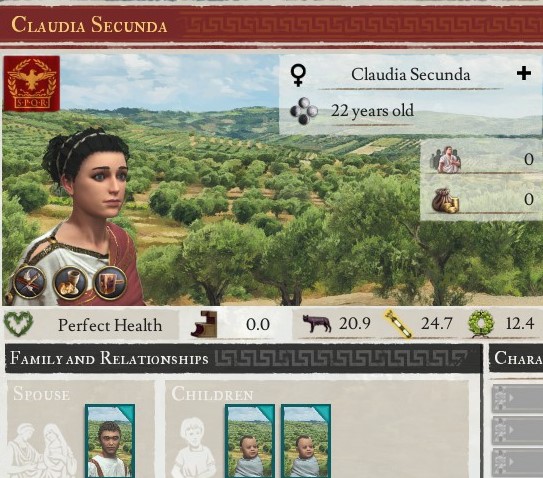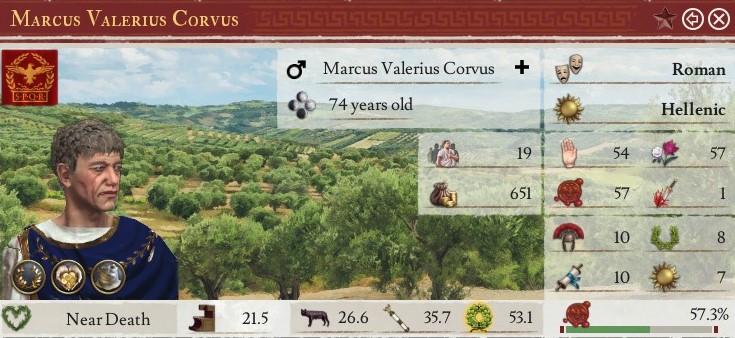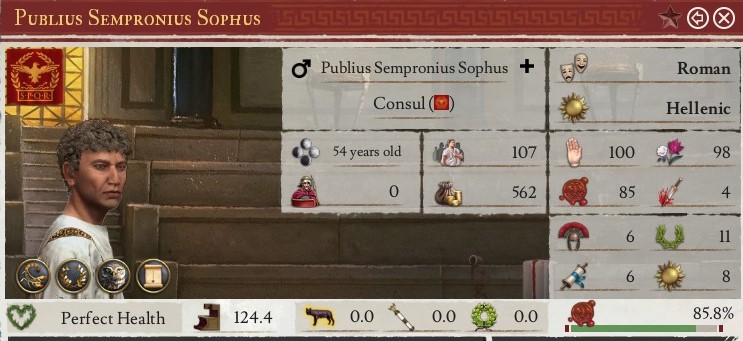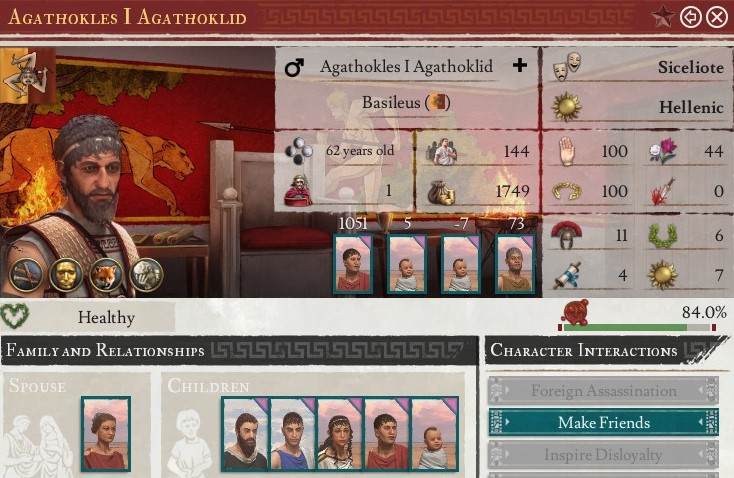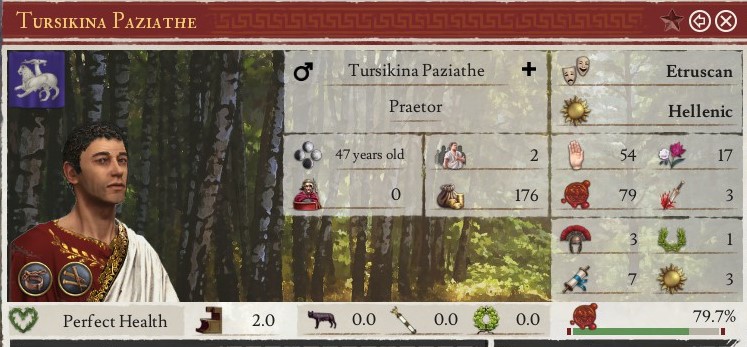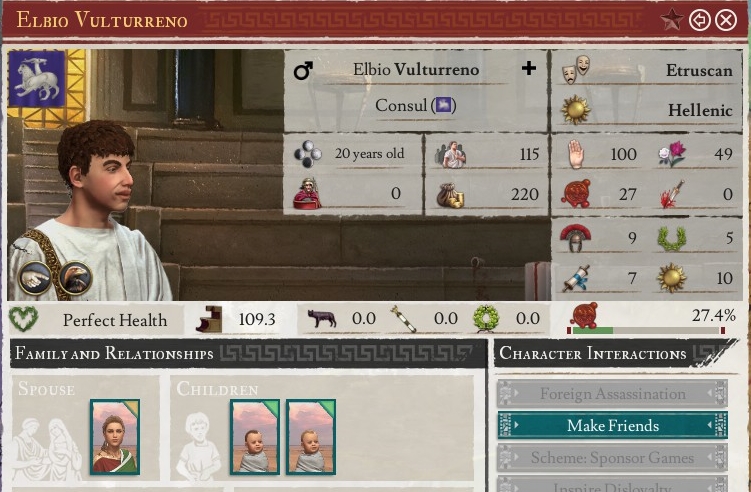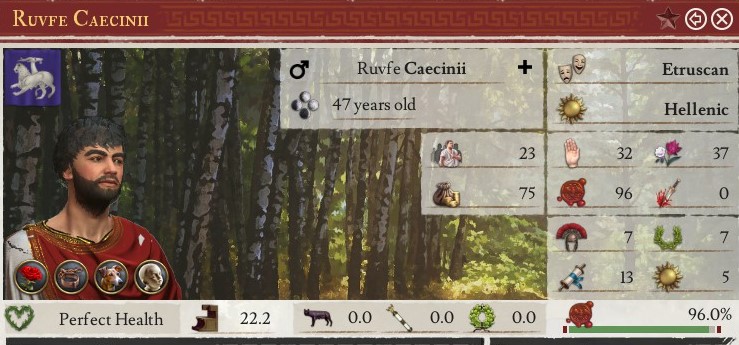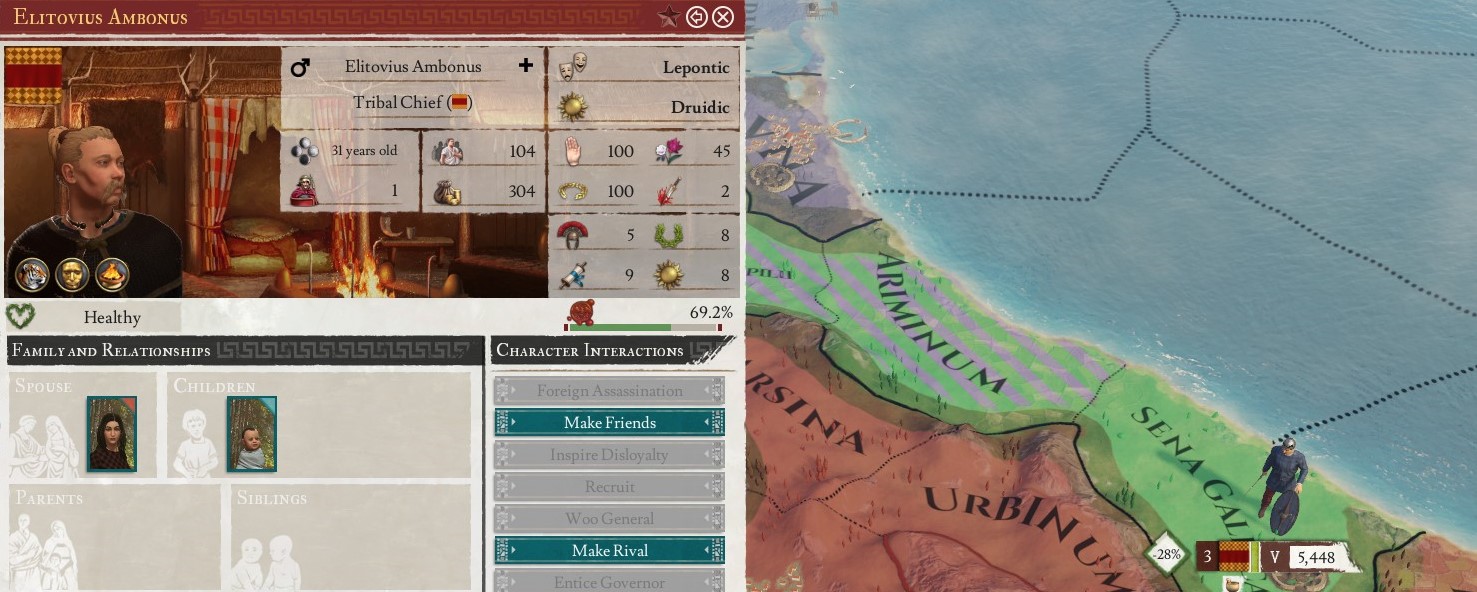A History of Rome
Prologue- The atrium of Aulus Verginius, The Palatine Hill, Rome, September 18th 304BC
The gathered crowd stood beaming, their eyes fixed at the beautiful woven archway beneath which Publius Sempronius Sophus and his bride, Verginia Aulia stood, a priest of Juno in between them.
“I say to all off you here to witness today, the union of the Publius and Verginia, what the Gods of sought fit to bring together, let no man alive seek to put asunder!” she bound their hands with chord, “They have spoken their vows before all here gathered here, before their ancestors and before the auspices of Jupiter and Juno, and thus I declare them man and wife!”
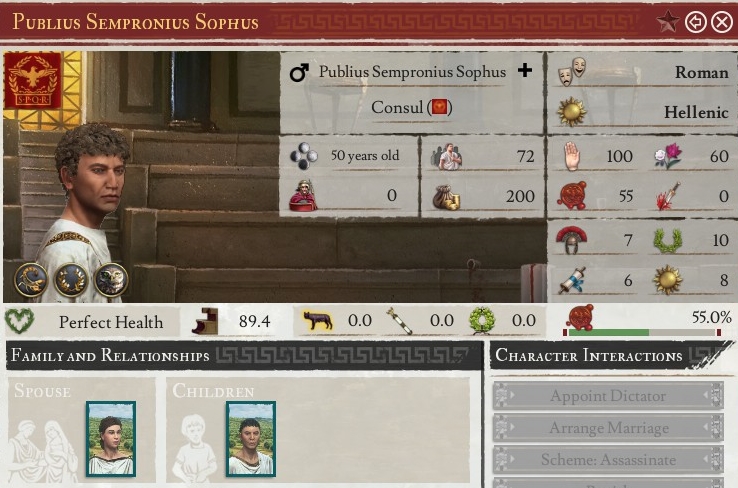
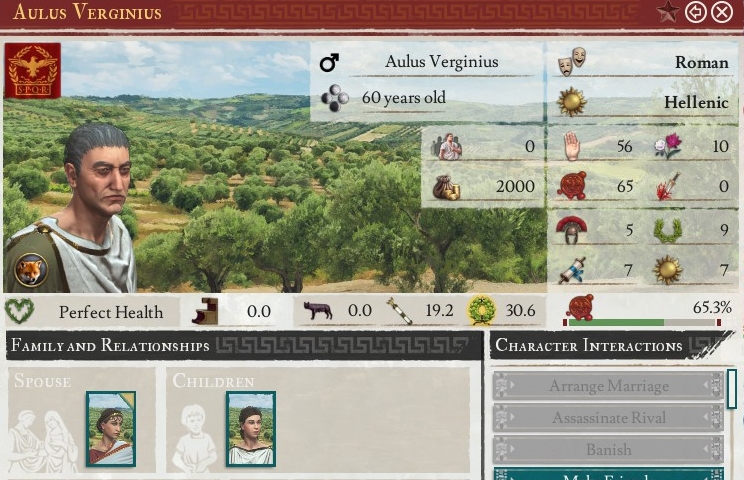
A burst of applause rang out across the atrium, cheers flew into the air and handfuls of flowers were suddenly tossed skyward by the young women of the crowd, congratulations and felicities from those men of rank, thought high enough to be invited.
One man, an old man, slightly bent over stepped forward, his face bright with joy but looking brilliant in his white toga, stepped toward the pair, “Today I gain a son!” Aulus Verginius, the brides father declared to the room, clasping the hand of Sempronius!
“I am honoured to gain a such a noble wife my friend” Sempronius gripped tightly the hand of his new wife, their hands still bound with chord, “That you trust me with your daughter’s hand is an honour beyond words!” They eyed one another, both Publius and Aulus, for though their friendship was genuine, this union was purely political, and all those gathered knew, this union would have repercussions across the whole political landscape in the days ahead; that one of Rome’s most popular men, with victories in battle to his name and a startling political career, should tie his name to the house of Rome’s wealthiest citizen would be noted even down amongst the slaves working along the docks of the Tibur.
Another man stepped forward, with light blond receding hair, Publius Sulpicious Saverrio, the groom’s colleague and co-candidate in the upcoming elections, “I wish a fruitful marriage not you both” he turned to the bride though he spoke to the groom, “You have a good woman here my friend, she is a woman of great virtue!” He smiled. Genuine perhaps, but the reality was, this marriage and the money that Aulus Verginius would now lend to their campaign for election almost guaranteed them both victory, since no other candidates could bring such wealth to bare in gifts, bribes and largesse.
Sempronius suddenly raised a hand, “I thank you, but let us not waste too much time with chatter, the ceremonies are not yet over, we have rights to perform before we dine and drink to this happy day!” Ever a practical man, he knew the proper rituals must be observed, even if they were largely unnecessary. He turned to his wife smiling warmly, gently touching her hand, she was much younger than he, an though he knew she was made of strong stock and could see her keen understanding, nevertheless she was much younger than him and he sensed her nervousness! He spoke softly in a voice low enough only she could here, “I will be a good husband and we will have a happy home” he patted her hand, “but you must now bid your father, your stepmother and servant’s farewell!” The ritual procession to the home of her new husband must begin.
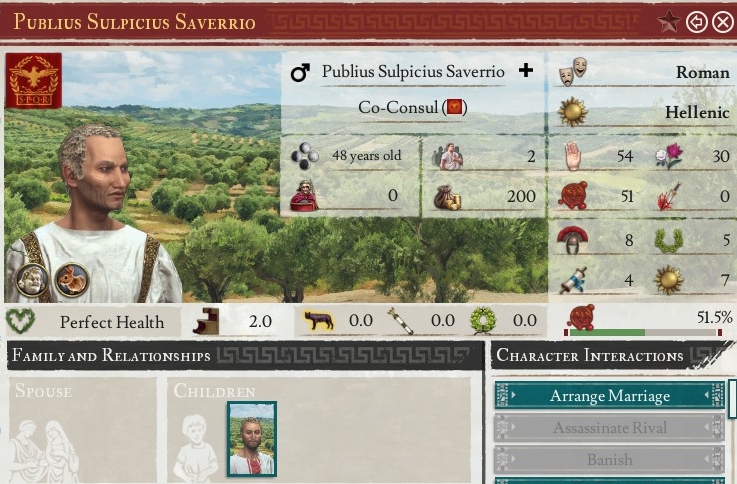
The House of Publius Sempronius Sophus, Palatine Hill, Evening, September 18th 304BC
Marcus Valerius Corvus gripped his son’s shoulder tightly, “Do try to smile Corvinus, this is meant to be a happy day!” The elder statesmen bowed his head lightly to a passing guest, both men in their senatorial toga’s flanked by their wives who looked radiant in their fine gowns.
“You think the union between these two houses is a cause for celebration?” the younger man laughed, “I fail to see it father, truly I do.” This time him offering a half salutation to a group of men stood sipping wine by a small pond in the houses inner garden.
“The Verginii and the Sempronii are outliers, as they always have been and I dare say always shall be”, they moved into the main dining room, taking a goblet each of watered down wine from a passing slave and their wives did the same, Corvus went on, “these two upstarts are no more or less than a dozen others who have fought for the Consuls chair. They will I am sure, win their election, but never fear” he half-smiled, ‘as happens time and again, the best-off intentions does not serve you against the squabbling egos of the Senate floor, nothing monumental will come of their time in office!”

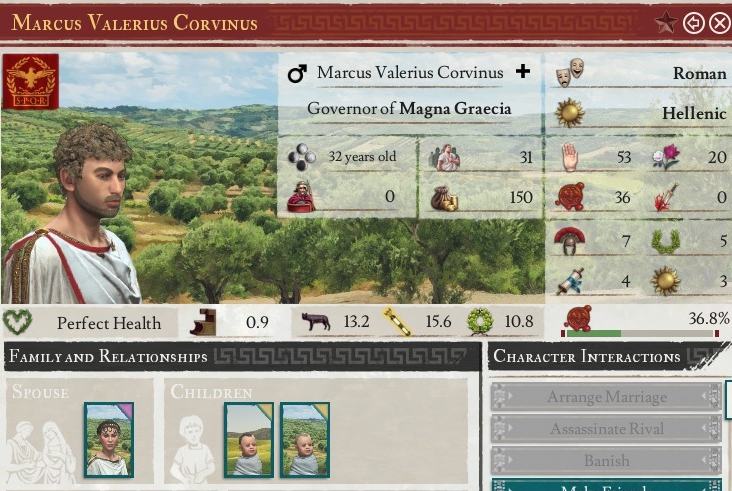
To the side of them suddenly another senator appeared, his extremally young wife looking startlingly fresh beside him, “Come to wish our future Consul’s well I see Marcus?” the Senator was none other than Quintus Fabius Rullianus, currently Censor, one of Rome’s highest offices. He had enjoyed his ascendeance into Rome’s elite but it was not lost on him that men like Marcus Corvus had a decade and mores experience over him, including a plethora of military and judicial postings.
“I am surprised to see you here my friend” Corvus retorted, “Did not your niece marry young Brutus, this morning?” he smirked, he knew without needing to ask that Fabia Tertia, had wed Decimus Junius Brutus this very day.
“Indeed” Rullianus was not a man to be easily bested, “a charming young man, with a promising career ahead off him I am sure!” The marriage was not a great political prize, but it was better to have Fabia married off, than languishing in some back room weaving blankets.
Corvinus stepped alongside his father protectively “All the more promising it will be now he is one of your own!”
Rullianus let a brief smile cross his face, looking suddenly to the young lady beside Corvinus, “Cornelia, I believe? Niece of the Pontiff?” he turned looking at the younger Marcus, “Sempronius is not the only one blessed with an advantageous wife!” The young lady blushed, barely a woman herself at sixteen and married off on the very day she came of age.
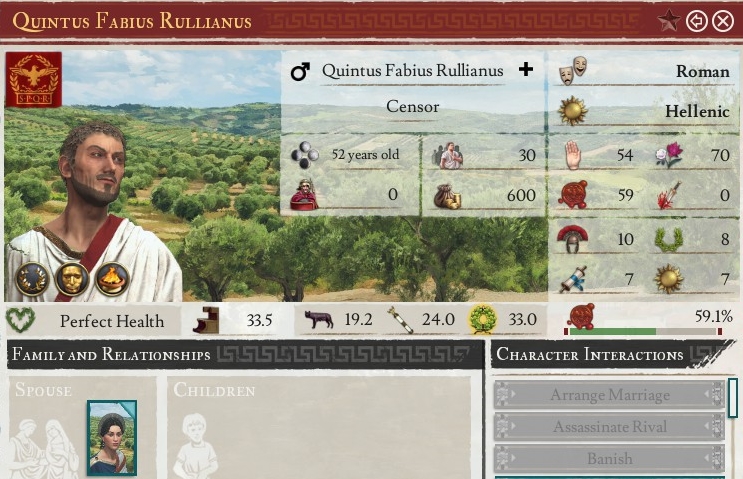
“A lovely house is it not?” the dark-haired, Aemilia Prima, wife of Rullianus interrupted. She was not wrong, for though there was some redecorating being done in other rooms and the main doorway was being renovated, the house of Sempronius was a very nice property indeed and more spacious than many would believe a first generation noble could afford. Had one not known better, then it would have been assumed that Sempronius must have near bankrupt himself, purchasing a property in such a prestigious part of the city.
The Temple of Jupiter Optimus Maximus, Capitoline Hill, Afternoon, September 26th 304BC
With faces smeared in the still hot blood of the sacrificial goats, the acolytes of the Temple turned to the crowd, chanting prayers to Jupiter in constant rhythm. Each carried a silver bowl, filled with yet more blood, to be dubbed upon the faces of the congregation. To the centre, at the feet of the statue of mighty Jupiter Capitolinus, stood Publius Cornelius Barbartus, the Pontifex Maximus, Rome’s highest priest.
“All has been done according to the most ancient rights, your offerings are well received” the high priests raised up his hands, bright red as they were with the blood of sacrifice. “With these gifts, we hope top satisfy the King of all the Mighty Gods and Protector of Rome, we ask with all humility that he will oversee the up coming elections and place his blessing upon those whom the People off Rome deem worthy to lead us!” Like so many of the nobles gathered, Cornelius knew that what the People of Rome wanted and what they eventually got, depended far more upon the whims of those gathered here, than the actual votes cast on the day, for it was these men and their supporters who would sway the elections.
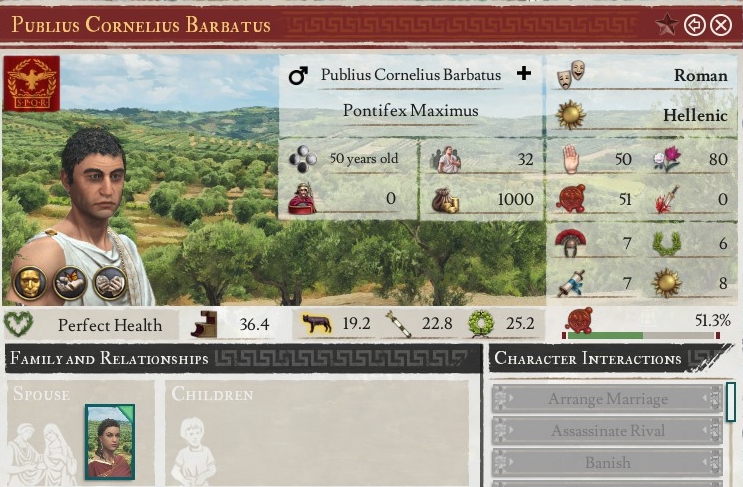
It was no coincidence that those invited to attend today’s ceremony where either members of the Optimate faction, men of influence amongst the voting tribes or members of the equestrian orders open to persuasion. It was also no secret that the current Pontifex Maximus was at the head of the Optimates and a keen advocate of the candidacy of Sempronius and Sulpicious, hence why they had been bought bullocks to sacrifice today out of Cornelius own purse. Having at one time been Consul himself, the Pontifex endorsement weighed heavy.
Without another word, the Pontifex nodded his head to the acolytes of the Temple, who moved down the few short steps with their blood-filled bowls, directed to dub the hot, red liquid upon the cheeks and forehead of the assembly, before they would emerge from the Temple and proceed down the hill into the forum. He winked, subtly to Sempronius, a tight smirk twitching at the edge of his mouth. The Gods would be contented, but more importantly the people would see the piety of the two candidates who had “financed” today’s ceremony and the blessing of Rome’s highest priesthood.
Gnaeus Flavius, the House of Shimon, late evening, September 28th 304BC
Shimon popped an olive into his mouth, an earthen bowl filled with them soaked in oils sat upon the table, some bread and cheeses lay out on a board. He sat upon a low stool rather comfortably and though the room they were in was a far cry from the bright colours and neat arches of homes on the Palatine, it was for what it was worth a comfortable dwelling. Miniature date palms, imported from the east, stood along the sides of the room in short, fat terracotta pots adding an air of the exotic, the small group of stools were covered by sheep and goat skin throws. The walls had been freshly painted a deep, earthy red and several candles lined various alcoves around the room, giving the whole space a warm glow. The host himself, with his thick, un-roman like beard, sat dressed in a fine wool tunic, dyed a rather pale green. For a wealthy man, he did not show much off by his dress, simple as it was.
Gnaeus Flavius was a Tribune of the Plebs, and was seeking to orchestrate the election of his friend Gaius Junius Bubalcus and Lucius Papirius Cursor, both men of considerable pedigree and both well respected amongst the populist faction of the Senate House.;
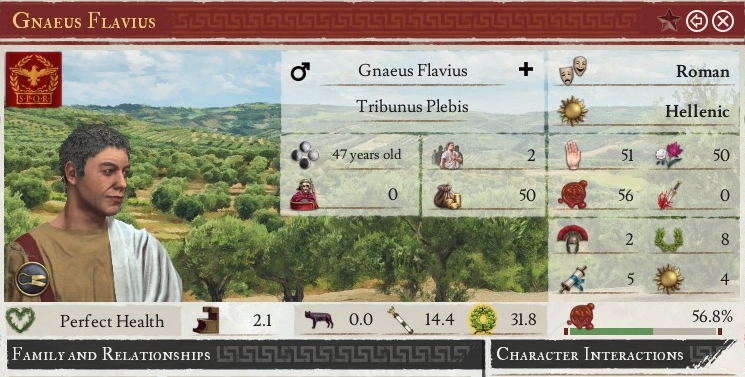
“It is not my friend that I do not value your custom” Shimon offered his hands out wide, “It is put simply, that we” he gestured to his associates sat behind him “are no longer able to offer you finance at this time” behind him, three other men, all money lenders, all bedecked in somewhat simple eastern fashion, bearded sat silent and grim faced. ‘In the future we will be happy to do business with you again’ he spoke with an honest tone.
“You were happy enough to do business with us last month” Gnaeus snapped, his face hardening, “what has changed?”
Shimon turned to his associates slightly, seeking support before reply, “Much my friend, much has changed!” he clearly did not wish to go into details. Jews were known for many things, one of their most discerning features being discretion.
Gnaeus pressed them, anger entering his voice, “They have bought you off, haven’t they? Sempronius and Sulpicius, they have got to you!” his tone changed again to one of a more friendly nature, “We have promised to do all within our power to make things more favourable for you and your people, what else do you want?” The Jewish businessmen of Rome, commanded considerable wealth and were frequent investors in the political arguments of the day, seeking as they did to improve the lot of the resident population by sponsoring those politicians who could protect them physically and legally. Gnaeus and his partner, had offered a whole raft of legal changes to the status of the Jewish population in return for their financial support.
“Truth be told” Shimon sighed, listening for a moment to one of his colleagues speaking in his ear in the Hebrew tongue, nodding agreeably, “its not what you can offer that is the issue, it is to put it simply that we know you cannot win” he paused, looking grave, “we can not support a candidate that is sure to loose, it makes no sense!”
Gnaeus face flared a deep red, jumping to his feet, nocked the wine vessel from the table cracking it wide open and sloshing its contents over the floor, he turned immediately for the door, “fucking slaves, all of you! Simpering slaves the whole lot of you!” he opened the door, his small entourage following him, “curse you bunch of foreign parasites and your God of bloody shepherds and sand!”
Acarro Vardus, Employee of the Grain Merchants Guild, Ostia, September 30th 304BC
Acarro breathed in deeply, the smell of salt coming in on the wind, a fine band of rain could be seen far out to sea moving toward land, the fine summer weather fighting hard against the coming autumn. He had six wagons with him and a staff of some twenty slaves, most of them Italian in origin, captured during the fall of Capua. Hundreds of sacks of grain were being offloaded on the dock side and the slaves were busy carrying them to the wagons, whilst Acarro kept a careful count on how many had been delivered and ensuring none where “misplaced.” Grain was a lucrative business and the Millers Guild had paid upfront for this shipment.
“I don’t envy you, your return voyage my friend” he barked at the ship’s captain, standing aboard his deep bottomed vessel, a man swathed in deep blue robes, a turban on his head and a dark pallor to his skin, it was hard to tell exactly where he came from since Carthage was a city even more diverse in its make-up than Rome, but nevertheless he was very clearly of African origin.
“Aye brother” the captain spoke in a very heavily accented Latin, “ Let us hope that Gods see fit to steer those clouds inland, I do not fancy crossing the open waters home with clouds looking so dark!”
Acarro had never left Rome, even by land, he had only travelled here to Ostia on the coast and to the foothills around Norba to the south east where his employers had estates and farmland. His family, the Vardii traced their origin back only as far from Rome as Veii, along the banks of the Tibur and even that was slowly being swallowed into the outer reaches of Rome itself. He had next to no knowledge of Carthage or Africa, save for that which he had learnt from the merchants he dealt with on behalf of his contractors, he did however, no that Carthage’s influence now stretched over half of Syracuse, the island to the south of the Italian mainland as this was something, he had heard discussed in the warehouses back in Rome, due mainly to the fact the recent conflicts between the Carthaginians and the Syracusan Kingdom of the Greek King Agothokles, had led to a sharp increase in the price of grain.
He often found it curious, that whilst he was curious about the goings on outside of Italy, finding great interest in these exotic lands across the sea, the merchants of Carthage seemed to have little interest in Roman affairs. They were traders and sea-farers, concerned only in the political goings on in the city so far as they affected import and export duties, supply and demand, more than that there was nothing.
Acarro had assumed at one point that it was simply in their nature to put business before all else, but it was only after his third or fourth meeting with this current grain merchant that he realised the real reason for this disinterest; Carthage simply did not view Rome as important of note, having seen numerous nations try to rise, only to fall! Such was the disunity amongst the Italian cities, they seemed to believe no challenge to their dominance of the western Mediterranean would ever rise from these shores! It shouldn’t have bothered him in the slightest, his friends had told him he was silly to take offence at such harmless disinterest, but it irked him, the arrogance of it! That Rome was not mighty and worthy of their respect, nagged at his guts! One day, he mused, he would see for himself the glory of Carthage and he was already sure it would not be in reality as these merchants suggested in their idle chatter.
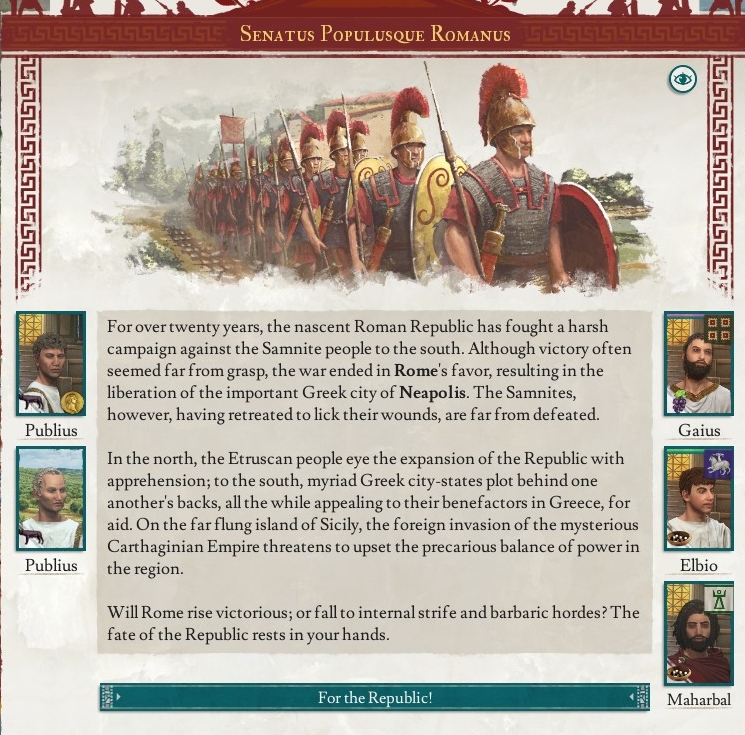
Prologue- The atrium of Aulus Verginius, The Palatine Hill, Rome, September 18th 304BC
The gathered crowd stood beaming, their eyes fixed at the beautiful woven archway beneath which Publius Sempronius Sophus and his bride, Verginia Aulia stood, a priest of Juno in between them.
“I say to all off you here to witness today, the union of the Publius and Verginia, what the Gods of sought fit to bring together, let no man alive seek to put asunder!” she bound their hands with chord, “They have spoken their vows before all here gathered here, before their ancestors and before the auspices of Jupiter and Juno, and thus I declare them man and wife!”


A burst of applause rang out across the atrium, cheers flew into the air and handfuls of flowers were suddenly tossed skyward by the young women of the crowd, congratulations and felicities from those men of rank, thought high enough to be invited.
One man, an old man, slightly bent over stepped forward, his face bright with joy but looking brilliant in his white toga, stepped toward the pair, “Today I gain a son!” Aulus Verginius, the brides father declared to the room, clasping the hand of Sempronius!
“I am honoured to gain a such a noble wife my friend” Sempronius gripped tightly the hand of his new wife, their hands still bound with chord, “That you trust me with your daughter’s hand is an honour beyond words!” They eyed one another, both Publius and Aulus, for though their friendship was genuine, this union was purely political, and all those gathered knew, this union would have repercussions across the whole political landscape in the days ahead; that one of Rome’s most popular men, with victories in battle to his name and a startling political career, should tie his name to the house of Rome’s wealthiest citizen would be noted even down amongst the slaves working along the docks of the Tibur.
Another man stepped forward, with light blond receding hair, Publius Sulpicious Saverrio, the groom’s colleague and co-candidate in the upcoming elections, “I wish a fruitful marriage not you both” he turned to the bride though he spoke to the groom, “You have a good woman here my friend, she is a woman of great virtue!” He smiled. Genuine perhaps, but the reality was, this marriage and the money that Aulus Verginius would now lend to their campaign for election almost guaranteed them both victory, since no other candidates could bring such wealth to bare in gifts, bribes and largesse.
Sempronius suddenly raised a hand, “I thank you, but let us not waste too much time with chatter, the ceremonies are not yet over, we have rights to perform before we dine and drink to this happy day!” Ever a practical man, he knew the proper rituals must be observed, even if they were largely unnecessary. He turned to his wife smiling warmly, gently touching her hand, she was much younger than he, an though he knew she was made of strong stock and could see her keen understanding, nevertheless she was much younger than him and he sensed her nervousness! He spoke softly in a voice low enough only she could here, “I will be a good husband and we will have a happy home” he patted her hand, “but you must now bid your father, your stepmother and servant’s farewell!” The ritual procession to the home of her new husband must begin.

The House of Publius Sempronius Sophus, Palatine Hill, Evening, September 18th 304BC
Marcus Valerius Corvus gripped his son’s shoulder tightly, “Do try to smile Corvinus, this is meant to be a happy day!” The elder statesmen bowed his head lightly to a passing guest, both men in their senatorial toga’s flanked by their wives who looked radiant in their fine gowns.
“You think the union between these two houses is a cause for celebration?” the younger man laughed, “I fail to see it father, truly I do.” This time him offering a half salutation to a group of men stood sipping wine by a small pond in the houses inner garden.
“The Verginii and the Sempronii are outliers, as they always have been and I dare say always shall be”, they moved into the main dining room, taking a goblet each of watered down wine from a passing slave and their wives did the same, Corvus went on, “these two upstarts are no more or less than a dozen others who have fought for the Consuls chair. They will I am sure, win their election, but never fear” he half-smiled, ‘as happens time and again, the best-off intentions does not serve you against the squabbling egos of the Senate floor, nothing monumental will come of their time in office!”


To the side of them suddenly another senator appeared, his extremally young wife looking startlingly fresh beside him, “Come to wish our future Consul’s well I see Marcus?” the Senator was none other than Quintus Fabius Rullianus, currently Censor, one of Rome’s highest offices. He had enjoyed his ascendeance into Rome’s elite but it was not lost on him that men like Marcus Corvus had a decade and mores experience over him, including a plethora of military and judicial postings.
“I am surprised to see you here my friend” Corvus retorted, “Did not your niece marry young Brutus, this morning?” he smirked, he knew without needing to ask that Fabia Tertia, had wed Decimus Junius Brutus this very day.
“Indeed” Rullianus was not a man to be easily bested, “a charming young man, with a promising career ahead off him I am sure!” The marriage was not a great political prize, but it was better to have Fabia married off, than languishing in some back room weaving blankets.
Corvinus stepped alongside his father protectively “All the more promising it will be now he is one of your own!”
Rullianus let a brief smile cross his face, looking suddenly to the young lady beside Corvinus, “Cornelia, I believe? Niece of the Pontiff?” he turned looking at the younger Marcus, “Sempronius is not the only one blessed with an advantageous wife!” The young lady blushed, barely a woman herself at sixteen and married off on the very day she came of age.

“A lovely house is it not?” the dark-haired, Aemilia Prima, wife of Rullianus interrupted. She was not wrong, for though there was some redecorating being done in other rooms and the main doorway was being renovated, the house of Sempronius was a very nice property indeed and more spacious than many would believe a first generation noble could afford. Had one not known better, then it would have been assumed that Sempronius must have near bankrupt himself, purchasing a property in such a prestigious part of the city.
The Temple of Jupiter Optimus Maximus, Capitoline Hill, Afternoon, September 26th 304BC
With faces smeared in the still hot blood of the sacrificial goats, the acolytes of the Temple turned to the crowd, chanting prayers to Jupiter in constant rhythm. Each carried a silver bowl, filled with yet more blood, to be dubbed upon the faces of the congregation. To the centre, at the feet of the statue of mighty Jupiter Capitolinus, stood Publius Cornelius Barbartus, the Pontifex Maximus, Rome’s highest priest.
“All has been done according to the most ancient rights, your offerings are well received” the high priests raised up his hands, bright red as they were with the blood of sacrifice. “With these gifts, we hope top satisfy the King of all the Mighty Gods and Protector of Rome, we ask with all humility that he will oversee the up coming elections and place his blessing upon those whom the People off Rome deem worthy to lead us!” Like so many of the nobles gathered, Cornelius knew that what the People of Rome wanted and what they eventually got, depended far more upon the whims of those gathered here, than the actual votes cast on the day, for it was these men and their supporters who would sway the elections.

It was no coincidence that those invited to attend today’s ceremony where either members of the Optimate faction, men of influence amongst the voting tribes or members of the equestrian orders open to persuasion. It was also no secret that the current Pontifex Maximus was at the head of the Optimates and a keen advocate of the candidacy of Sempronius and Sulpicious, hence why they had been bought bullocks to sacrifice today out of Cornelius own purse. Having at one time been Consul himself, the Pontifex endorsement weighed heavy.
Without another word, the Pontifex nodded his head to the acolytes of the Temple, who moved down the few short steps with their blood-filled bowls, directed to dub the hot, red liquid upon the cheeks and forehead of the assembly, before they would emerge from the Temple and proceed down the hill into the forum. He winked, subtly to Sempronius, a tight smirk twitching at the edge of his mouth. The Gods would be contented, but more importantly the people would see the piety of the two candidates who had “financed” today’s ceremony and the blessing of Rome’s highest priesthood.
Gnaeus Flavius, the House of Shimon, late evening, September 28th 304BC
Shimon popped an olive into his mouth, an earthen bowl filled with them soaked in oils sat upon the table, some bread and cheeses lay out on a board. He sat upon a low stool rather comfortably and though the room they were in was a far cry from the bright colours and neat arches of homes on the Palatine, it was for what it was worth a comfortable dwelling. Miniature date palms, imported from the east, stood along the sides of the room in short, fat terracotta pots adding an air of the exotic, the small group of stools were covered by sheep and goat skin throws. The walls had been freshly painted a deep, earthy red and several candles lined various alcoves around the room, giving the whole space a warm glow. The host himself, with his thick, un-roman like beard, sat dressed in a fine wool tunic, dyed a rather pale green. For a wealthy man, he did not show much off by his dress, simple as it was.
Gnaeus Flavius was a Tribune of the Plebs, and was seeking to orchestrate the election of his friend Gaius Junius Bubalcus and Lucius Papirius Cursor, both men of considerable pedigree and both well respected amongst the populist faction of the Senate House.;

“It is not my friend that I do not value your custom” Shimon offered his hands out wide, “It is put simply, that we” he gestured to his associates sat behind him “are no longer able to offer you finance at this time” behind him, three other men, all money lenders, all bedecked in somewhat simple eastern fashion, bearded sat silent and grim faced. ‘In the future we will be happy to do business with you again’ he spoke with an honest tone.
“You were happy enough to do business with us last month” Gnaeus snapped, his face hardening, “what has changed?”
Shimon turned to his associates slightly, seeking support before reply, “Much my friend, much has changed!” he clearly did not wish to go into details. Jews were known for many things, one of their most discerning features being discretion.
Gnaeus pressed them, anger entering his voice, “They have bought you off, haven’t they? Sempronius and Sulpicius, they have got to you!” his tone changed again to one of a more friendly nature, “We have promised to do all within our power to make things more favourable for you and your people, what else do you want?” The Jewish businessmen of Rome, commanded considerable wealth and were frequent investors in the political arguments of the day, seeking as they did to improve the lot of the resident population by sponsoring those politicians who could protect them physically and legally. Gnaeus and his partner, had offered a whole raft of legal changes to the status of the Jewish population in return for their financial support.
“Truth be told” Shimon sighed, listening for a moment to one of his colleagues speaking in his ear in the Hebrew tongue, nodding agreeably, “its not what you can offer that is the issue, it is to put it simply that we know you cannot win” he paused, looking grave, “we can not support a candidate that is sure to loose, it makes no sense!”
Gnaeus face flared a deep red, jumping to his feet, nocked the wine vessel from the table cracking it wide open and sloshing its contents over the floor, he turned immediately for the door, “fucking slaves, all of you! Simpering slaves the whole lot of you!” he opened the door, his small entourage following him, “curse you bunch of foreign parasites and your God of bloody shepherds and sand!”
Acarro Vardus, Employee of the Grain Merchants Guild, Ostia, September 30th 304BC
Acarro breathed in deeply, the smell of salt coming in on the wind, a fine band of rain could be seen far out to sea moving toward land, the fine summer weather fighting hard against the coming autumn. He had six wagons with him and a staff of some twenty slaves, most of them Italian in origin, captured during the fall of Capua. Hundreds of sacks of grain were being offloaded on the dock side and the slaves were busy carrying them to the wagons, whilst Acarro kept a careful count on how many had been delivered and ensuring none where “misplaced.” Grain was a lucrative business and the Millers Guild had paid upfront for this shipment.
“I don’t envy you, your return voyage my friend” he barked at the ship’s captain, standing aboard his deep bottomed vessel, a man swathed in deep blue robes, a turban on his head and a dark pallor to his skin, it was hard to tell exactly where he came from since Carthage was a city even more diverse in its make-up than Rome, but nevertheless he was very clearly of African origin.
“Aye brother” the captain spoke in a very heavily accented Latin, “ Let us hope that Gods see fit to steer those clouds inland, I do not fancy crossing the open waters home with clouds looking so dark!”
Acarro had never left Rome, even by land, he had only travelled here to Ostia on the coast and to the foothills around Norba to the south east where his employers had estates and farmland. His family, the Vardii traced their origin back only as far from Rome as Veii, along the banks of the Tibur and even that was slowly being swallowed into the outer reaches of Rome itself. He had next to no knowledge of Carthage or Africa, save for that which he had learnt from the merchants he dealt with on behalf of his contractors, he did however, no that Carthage’s influence now stretched over half of Syracuse, the island to the south of the Italian mainland as this was something, he had heard discussed in the warehouses back in Rome, due mainly to the fact the recent conflicts between the Carthaginians and the Syracusan Kingdom of the Greek King Agothokles, had led to a sharp increase in the price of grain.
He often found it curious, that whilst he was curious about the goings on outside of Italy, finding great interest in these exotic lands across the sea, the merchants of Carthage seemed to have little interest in Roman affairs. They were traders and sea-farers, concerned only in the political goings on in the city so far as they affected import and export duties, supply and demand, more than that there was nothing.
Acarro had assumed at one point that it was simply in their nature to put business before all else, but it was only after his third or fourth meeting with this current grain merchant that he realised the real reason for this disinterest; Carthage simply did not view Rome as important of note, having seen numerous nations try to rise, only to fall! Such was the disunity amongst the Italian cities, they seemed to believe no challenge to their dominance of the western Mediterranean would ever rise from these shores! It shouldn’t have bothered him in the slightest, his friends had told him he was silly to take offence at such harmless disinterest, but it irked him, the arrogance of it! That Rome was not mighty and worthy of their respect, nagged at his guts! One day, he mused, he would see for himself the glory of Carthage and he was already sure it would not be in reality as these merchants suggested in their idle chatter.

- 1


